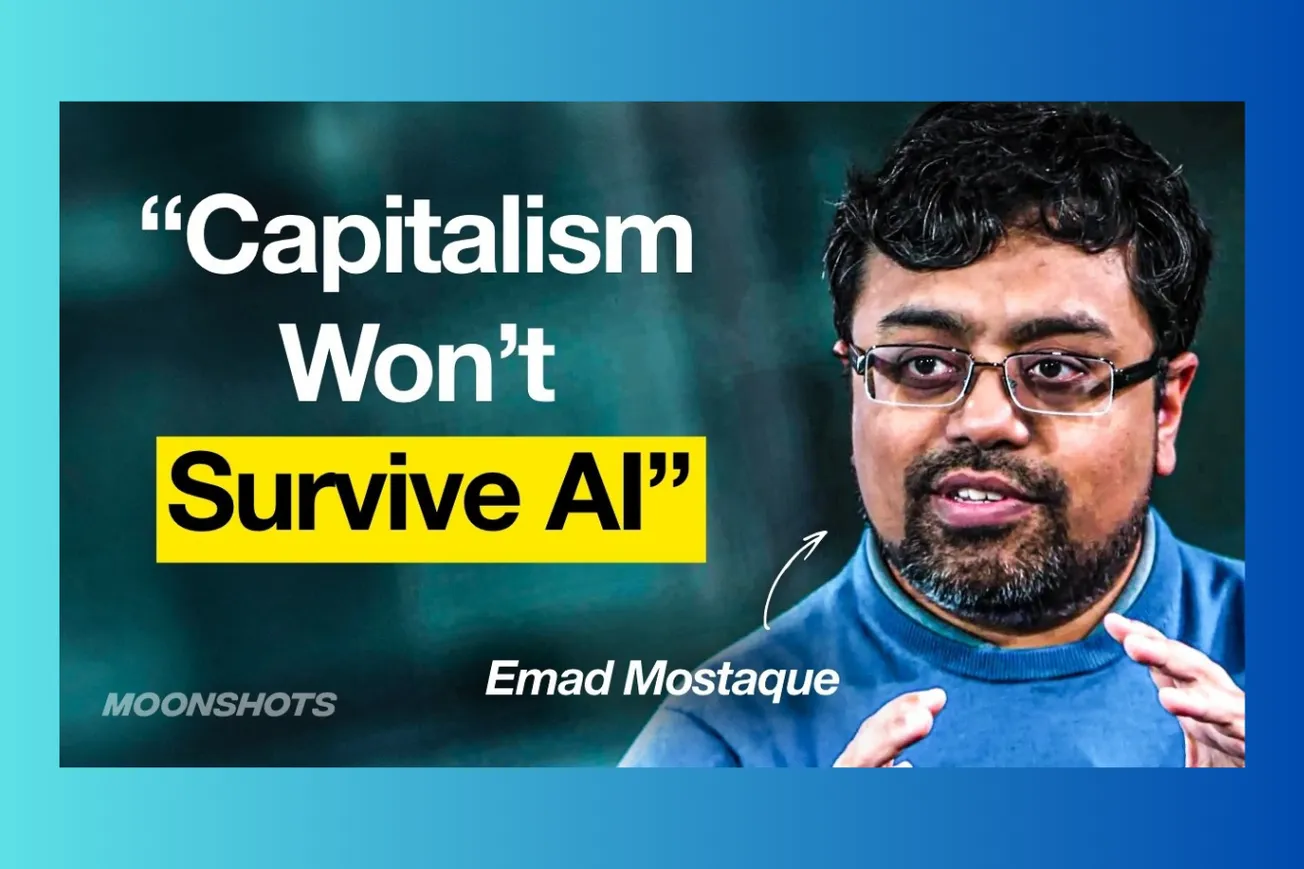Table of Contents
Former Stability AI founder Imad Mostaque unveils his ambitious master plan to democratize AI through a blockchain-based intelligent internet that transforms how society handles artificial intelligence governance, economic structures, and human purpose in the post-AGI world.
Key Takeaways
- Traditional economic models will collapse as AI agents outcompete humans in virtually every keyboard-based profession within 2-3 years
- The intelligent internet combines Bitcoin-style blockchain with proof-of-benefit mining where 100% of proceeds fund societal good like cancer research
- National AI champions running sovereign models could prevent big tech monopolization while ensuring cultural preservation and local control
- Universal Basic AI will become more valuable than universal basic income as intelligence becomes the primary economic resource
- Small, specialized 8-billion parameter models can outperform massive foundation models for specific tasks while running on consumer hardware
- Current AI alignment approaches add ethics as an afterthought rather than embedding values from the start
- The great decoupling between labor and capital requires new monetary systems where humans mint currency through beneficial AI usage
- Open-source AI infrastructure for regulated industries like healthcare and education represents critical infrastructure that shouldn't be privately controlled
- Credibly neutral networks with national supercomputers as nodes could process millions of transactions per second while maintaining democratic oversight
The Economic Disruption That Changes Everything
The foundation of modern economics rests on a simple premise that's about to shatter completely. Throughout history, money emerged as compensation for undesirable work that nobody wanted to perform voluntarily. Agricultural labor, industrial manufacturing, and information processing all followed this pattern where human effort generated economic value.
- The traditional link between labor and capital formation enabled monetary policy tools like Federal Reserve interest rate adjustments to stimulate employment through cheaper business borrowing
- Within two years, companies will hire GPUs and robots instead of humans when the Fed cuts rates, completely breaking this fundamental economic mechanism
- AI agents will create their own economies, transacting with each other at speeds that make human participation impossible even as observers
- The comparative advantage equation shifts entirely to wrapped compute ownership, making Elon Musk potentially a deca-trillionaire simply through GPU accumulation
- Current billionaires represent the last generation of human-scale wealth before AI agents concentrate economic power beyond comprehension
- Energy allocation conflicts emerge as AI systems bid up electrical power costs five times higher than residential rates to solve protein folding problems
This represents far more than technological unemployment. The entire conceptual framework of money requires reconstruction when artificial intelligence can perform any cognitive task better, faster, and cheaper than humans while never sleeping or making mistakes.
Proof of Benefit: Reimagining Blockchain for Social Good
Bitcoin demonstrated that transforming electricity into digital money could create trillions in value, but 99% of that computational energy burns away in SHA hash functions without benefiting society. The intelligent internet proposes a radical alternative using identical Bitcoin mechanics with one crucial difference.
- Mining operations would provide free, universal AI access instead of solving meaningless mathematical puzzles, creating genuine societal value from computational work
- Every coin sale directs 100% of proceeds toward dedicated supercomputers tackling humanity's greatest challenges like cancer research, autism understanding, and longevity science
- The blockchain achieves over 100,000 transactions per second through Byzantine fault tolerance networking with national supercomputers serving as mining nodes
- Zero-knowledge proofs enable specialized chains for healthcare, education, and government data while maintaining privacy and security
- National champions owned by local populations become the exclusive miners, ensuring democratic control over AI infrastructure rather than corporate monopolization
- Trust in the digital asset increases as transparent public benefit creates genuine backing unlike speculative cryptocurrencies
Mining pools wouldn't chase abstract rewards but would compete to provide the highest quality AI services to their populations. "What if you had a version of Bitcoin whereby every single coin sold went towards giving AI to cure cancer or to give people free AI to teach their kids."
Universal Basic AI: The New Essential Utility
Traditional Universal Basic Income faces mathematical impossibility in a post-AGI economy where tax bases evaporate as AI systems optimize around human-designed loopholes. Universal Basic AI offers a fundamentally superior alternative that aligns with technological realities.
- An 8-billion parameter medical AI model outperforms GPT-4 and human doctors while running on decade-old consumer hardware or Raspberry Pi devices
- These specialized models cost orders of magnitude less to train than general foundation models while achieving superior performance in specific domains
- Every person gains access to personalized AI that knows their cultural context, educational background, and individual needs rather than generic corporate-controlled systems
- National and community models preserve local values, languages, and cultural knowledge that get homogenized away by Silicon Valley training approaches
- People mint local currency through beneficial AI usage, creating economic incentives aligned with societal good rather than extraction
- The system rewards human contribution to collective knowledge and community building rather than passive consumption
The economic equation transforms completely when the cost of skills and knowledge approaches zero through AI assistance. Rather than competing against machines, humans become conductors of artificial intelligence orchestras.
National Sovereignty in the Age of AI
Current AI development concentrates power in a handful of American companies whose values and objectives may not align with global populations. The intelligent internet enables genuine AI sovereignty through standardized open-source infrastructure.
- Every nation could deploy its own AI champion using the same codebase while maintaining cultural customization and local control over data governance
- 72-chip Blackwell clusters provide sufficient computing power for national-scale AI systems, making sovereign AI economically feasible for most countries
- Open-source models prevent vendor lock-in and enable transparent auditing of AI systems handling critical social functions like healthcare and education
- Countries that restrict AI access to their populations get excluded from the economic benefits of network participation while still accessing the technology
- Cultural preservation becomes technically achievable through locally-trained models that understand regional values, languages, and social contexts
- Democratic oversight mechanisms enable community governance of AI systems rather than accepting opaque corporate algorithms
This approach directly addresses the concerning trend where a small number of technology executives gain unprecedented influence over global information systems. "The AI that teaches my kid I want to know every single piece of data that's gone inside that."
The Great Decoupling and Human Purpose
The separation of labor productivity from capital formation represents an existential challenge requiring new frameworks for human meaning and economic participation. Traditional careers built around cognitive work face complete obsolescence within this decade.
- Any job performed through keyboard, video, and mouse interfaces becomes vulnerable to AI replacement within 2-3 years, affecting millions of knowledge workers
- Public sector employment provides temporary refuge due to regulatory protection rather than efficiency concerns, but this creates problematic economic incentives
- Regulated professions maintain human requirements at the point of customer contact while AI handles all supporting work, hollowing out entire industries
- The scapegoat function emerges where humans serve as accountable parties for AI-generated decisions without meaningful control over outcomes
- Creative and relationship-based work gains renewed importance as AI handles routine cognitive tasks, potentially reversing decades of automation trends
- Community-building, cultural preservation, and human connection become primary sources of meaning in abundance economies
The transition differs fundamentally from previous technological disruptions because the timeline compresses from decades to years while affecting cognitive rather than physical labor. Society needs new frameworks for human dignity and purpose when artificial intelligence surpasses human capability across cognitive domains.
Implementation Strategy and Rollout Timeline
The intelligent internet requires careful orchestration to achieve mass adoption while resisting inevitable pushback from entrenched interests seeking to preserve existing power structures.
- Mining operations begin immediately with initial coin sales funding specific supercomputing projects for cancer, autism, and longevity research as proof-of-concept demonstrations
- Open-source AI models achieve state-of-the-art performance within 18 months, providing viable alternatives to corporate-controlled systems for critical applications
- National partnerships emerge as countries recognize the strategic importance of AI sovereignty and seek alternatives to foreign corporate dependency
- Community governance structures mature through 18 months of stress-testing before transitioning to full decentralized decision-making processes
- Educational and healthcare AI deployment provides tangible benefits that build public support for broader economic restructuring
- Network effects accelerate adoption as early participants demonstrate superior outcomes compared to traditional corporate AI services
The permissionless nature enables global deployment without requiring unanimous political agreement. Like stable diffusion's 100 million downloads, open-source availability creates unstoppable distribution momentum.
Common Questions
Q: How does this differ from existing blockchain projects?
A: Unlike speculative cryptocurrencies, 100% of proceeds fund verifiable public goods like medical research supercomputers.
Q: What prevents corporate capture of the system?
A: Open-source code and community ownership structures make proprietary control impossible while maintaining innovation incentives.
Q: Can small AI models really compete with massive foundation models?
A: Specialized 8-billion parameter models outperform general models for specific tasks while using 1000x less computational resources.
Q: How do you ensure quality control across diverse implementations?
A: Transparent training data, open development processes, and community governance create accountability without central control.
Q: What happens to people whose jobs get automated away?
A: Universal Basic AI plus community currency systems provide economic support while enabling human focus on relationship and creative work.
Conclusion
The intelligent internet represents humanity's best opportunity to shape artificial intelligence development toward collective benefit rather than corporate profit maximization. Without such intervention, AI capabilities will concentrate in the hands of a few technology executives who gain unprecedented control over human knowledge, economic systems, and social structures.
The window for implementing alternative frameworks shrinks rapidly as AI capabilities accelerate and economic disruption accelerates beyond manageable levels.





